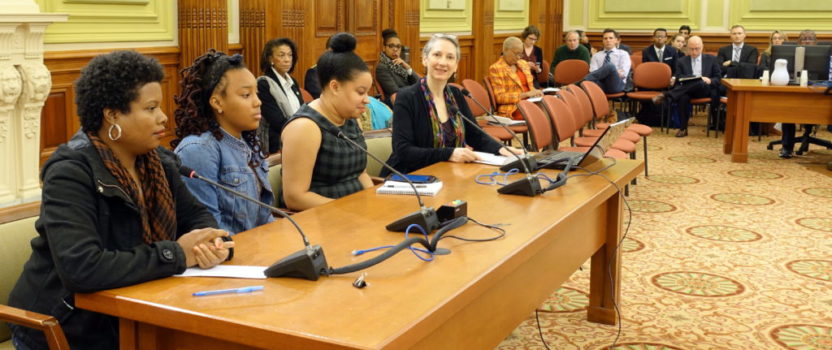“That’s not okay”: Community Members Speak out Against Harassment at DC Council Roundtable Discussion
“When I was coming up, I was harassed by men on the street often, but I didn’t see it as harassment,” testified Schyla Pondexter-Moore at DC’s first roundtable discussion on street harassment, “That was something that I just felt that you had to deal with.”
But when her 15-year-old daughter came to her asking how to deal with unwanted comments she received from men on the street or on public transit, Schyla said, “That made me start to think, ‘That’s not okay, and it wasn’t okay when it happened to me.’”
For over four hours last Thursday, DC Council heard from women of all walks of life — mothers, daughters, trans and queer women, women of different religious backgrounds and racial identities — about the ways that public sexual harassment and assault, more commonly known as street harassment, affects their lives. We heard similar themes: most experienced harassment for the first time at age 11 or 12; most experience it on a daily basis; it’s more severe for women of color and particularly transwomen of color; and it’s triggering for survivors of past violence or abuse.
Schyla Pondexter-Moore, also known (by me) as Superhero Mom, says, “I don’t think you should lock people up for catcalling, but there should be some kind of public service — something put in place — to let men know that this is not okay.”
And that’s what we want to see. CASS joined community members in asking DC Council to help us develop more and better public awareness campaigns, more ways to report and collect data on harassment, more training for those who are uniquely positioned to address the problem: school staff and administrators, bar staff and managers, public transit staff, and the Metropolitan Police Department (MPD).
The Washington Metropolitan Area Transit Authority (WMATA) has set the bar high for taking action to address harassment through a multiyear PSA campaign, an online reporting portal, trainings for transit officers and frontline staff, and most recently a commitment to help us survey transit users about their experiences with harassment and with reporting it. We want to see DC nightlife and other city leaders follow suit.
I’m grateful to all of our partners: Stop Street Harassment’s Holly Kearl, Defend Yourself’s Lauren Taylor, and leader in the movement against harassment Marty Langelan for sharing your expertise on harassment and bystander intervention as a tool to address it; the DC Rape Crisis Center, WIN, DC NOW, and the DC Coalition Against Domestic Violence for all of the outreach you did to encourage people to join us to testify, the Network for Victim Recovery DC for helping us to support survivors who shared their stories, and Casa Ruby for ensuring that the voices of trans community were heard and will be considered as we work toward making public spaces safe for everyone.
Want to read more? Check out this piece in the Washington Post and a full recap (with video!) on the Stop Street Harassment blog.

